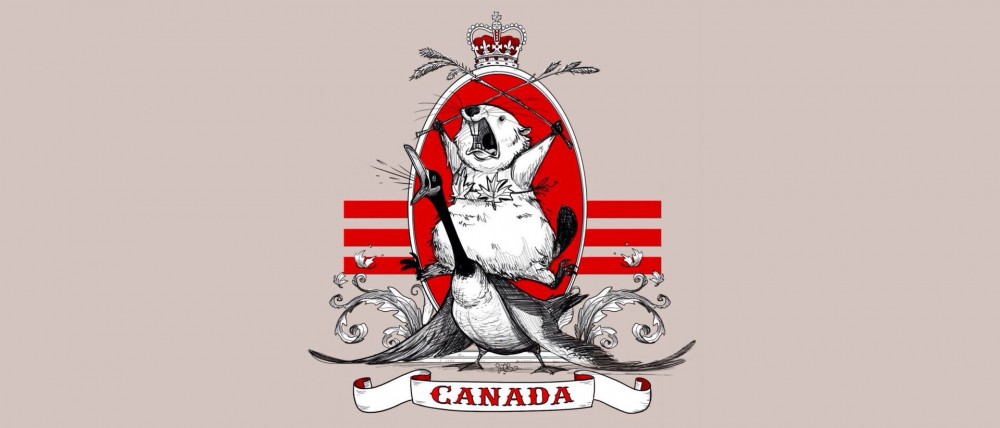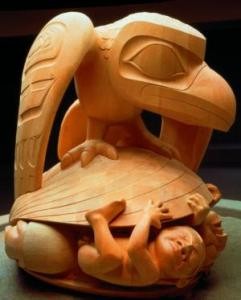Lesson 1:2 Question 5
At the heart of the intersection between story and literature we will easily find the meeting of native and newcomer, and as Chamberlin says, “I keep returning to the experience of aboriginal peoples because it seems to me to provide a lesson for us all. And for all its [Canada] much-vaunted reputation as an international mediator and peacemaker, it is in this story of natives and newcomers that Canada really has something to offer the world” (228). And, then he goes on to propose: “Why not change underlying title back to aboriginal title?” (229). Explain how Chamberlin justifies this proposal.
In the last chapter of If this is your Land Where are your stories? Finding Common Ground J. Edward Chamberlin brings the book to a close by suggesting that we should change Canada’s underlying title back to the aboriginal title. He Justifies his proposal by explaining how this will allow Canada to reconcile with its Aboriginal people, and provide the world with an example of how to make peace with the original inhabitants of our country.
“Land means more than property” to aboriginal cultures (Armstrong). It is an essential part of their culture, history, and spirituality (Armstrong), and Chamberlin emphasises the importance of land in aboriginal culture throughout his book. Changing the title of the land back to its aboriginal title “would finally provide a constitutional ceremony of belief in the humanity of aboriginal peoples in the Americas” (Chamberlin 231). In other words changing the land title provides a ceremonial construct of recognizing whose land we are living on. It is a big step in reconciling aboriginal relations in Canada because it acknowledges that: yes this land was originally yours and we did take it from you. Chamberlin also says that changing the land title also recognizes aboriginals’ humanity. It allows them to be seen as people and the original occupants of Canada rather than the “others”. This eliminates the delusion of “them” and “us” and brings aboriginal peoples into the forefront of our shared history (Chamberlin 239).
In addition, Chamberlin justifies his proposal by revisiting the idea that stories are both true and untrue. He says “it is in the act of believing in these stories and ceremonies… that we come together, and this act of believing can provide common ground across cultures…” (224). We do not need to see each others beliefs as true but we do need to respect them and acknowledge their equal importance to our own, after all they are just stories but they are very important to our identities.
For example, there is one Haida myth that I remember learning about in elementary school. It is the Haida creation story called the Raven and the First Men – or at least that is what it has become called in English. In contrast the Settlers of Canada brought their own creation story with them to the Americas: the Christian creation story. To this day both groups believe in the truth of their stories, but a third story has also emerged commonly known as the Big Bang Theory. All stories have their truth, and depending what your own belief system is you will find that one story is truer to you than some of the others but, as Chamberlin would say, this does not make the other stories less true. By changing Canada’s title back to aboriginal title we recognize everyones’ stories as having truth.
For those who think changing Canada’s title to aboriginal title would change day to day life in Canada, or is going backwards rather than forwards Chamberlin responds: “ Let’s get serious. The past is where we live with the settlers’ stories anyway… changing the title wouldn’t mean that the Indian chief could come and sit on my doorstep or walk into my house, any more than the Queen or president could right now” (Chamberlin 230-31). Nothing in day to day life would really change, but we would be recognizing Canada’s first inhabitants as the rightful owners of this land. Canada has the opportunity to set an example for the world by acknowledging both aboriginal and settlers’ stories through the ceremonial re-titling of Canada. This will allow all of our stories to be recognized “on common ground” (Chamberlin 240).
Works Cited:
Armstrong, Jeanette. “Land & Rights.” Land & Rights. UBC First Nations Study Program, 2009. Web. 17 Jan. 2016.
Chamberlin, J. Edward. If This Is Your Land, Where Are Your Stories?: Finding Common Ground. Toronto: Vintage Canada, 2004. Print.
Howell, Elizabeth. “What Is the Big Bang Theory?” Space. Space, 22 June 2015. Web. 18 Jan. 2016.
McWilliams, Barry. “Raven Finds the First Men.” Raven and The First Men. Eldrabarry, 1997. Web. 18 Jan. 2016.
Reid, Bill. The Raven and the First Men. Digital image. Virtual Museum. The Canadian Museum of History, 2000. Web. 17 Jan. 2016.


Hi Nicole!
Thank you for the insightful entry. Your discussion about the tensions underlying the word “land” was wonderful to read. Certainly, for aboriginal cultures, the word harnesses a cultural power that has a different essence than the word does for the European immigrants and now, the “modern-day Canadian.”
Seeing the multiplicity in meaning of that word ties in very nicely with the discussion of the “story of underlying aboriginal title” (Chamberlin 229). Your observation of three stories (the Haida creation story, the Christian creation story and the Big Bang Theory) and their co-existence was a thought-provoking example. Your examination of these stories remind me of Chamberlain’s chapter on charms. In particular, this line: “But the relationship between dream and reality that it represents is more common than we might imagine, and belongs to us all through our own stories and songs” (180). This is the common ground Chamberlain seems to define and it is made of the many stories you have outlined some of them already!
How do you think can we regard other cultures’ stories and beliefs with equal importance? For the educated person, it will be easier to break through such prejudices, but through what avenues do you believe we can make the multitude of Canadian stories as significant as the other?
Thanks so much for the lovely post!
Brendan
Hi Brendan,
Thank you for your nice comment! I’m glad you enjoyed reading my blog. Your Chamberlin quote from page 180 really captures what I was trying to explain by my different examples of creation stories.
I think you are right that the more educated people are the easier it is for them to over come prejudices. With this in mind i think educating people on all of Canada’s story’s is very important. Maybe we could implement new curriculum in the school system to teach young Canadians First Nations’ history and stories in addition the the settlers stories we already tell. I have always remembered the Haida creation story since I leaned it as a child. I think learning other cultures stories stays with you forever if you learn then at a young age.Usually when people understand something better they can accept its importance and value to society rather than simply dismissing it.
Nicole
Hi Nicole. Your post was very, very interesting. As Canada is now finally coming to grips with that tragic part of this land’s history,there is a lot of debate abut the best way. The suggestion of changing Canada’s name is an interesting one that provokes a lot of thought. And I think it also brings up the question once again of whose land? Canada never had one identity for this land, even before European contact. How has the drawing of border lines forever changed the trajectory of history? The land that was collectively used by one Aboriginal group or another is no longer the same but has been divided between the US and provinces and so on. And also, is the very concept of naming the land an ethnocentric one borrowed from the European colonizers? After all, for so many groups before, they simply called the land whatever corresponded to ‘home’ in their language.
Hi Maryam,
Thank you for your comment! Your questions are tough and thought provoking. I think they are the very questions the Canadian government is grappling with everyday when it comes to amending settlers’ mistreatment (and ongoing mistreatment some would say) of First Nations groups around the country. I definitely do not have answers to them.
Thanks again,
Nicole